#american brujeria
Text
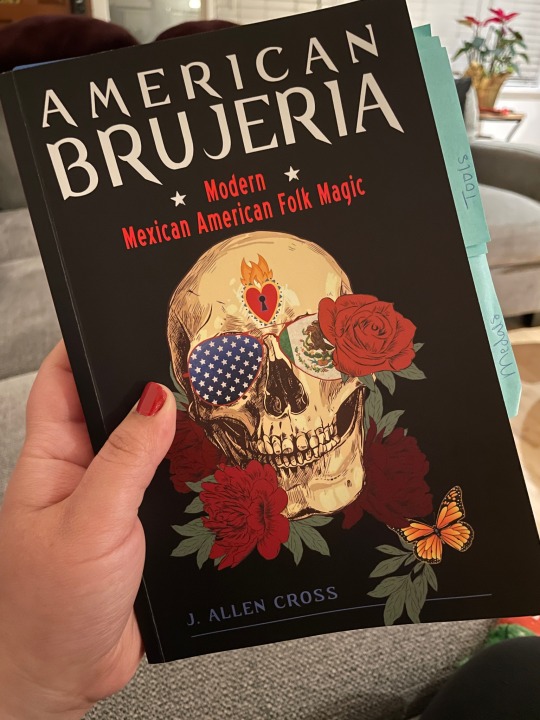
Just finished reading American Brujeria by J. Allen Cross and I have to say I LOVE this book so much! I recommend it to everyone but especially for Mexican American or Latin@ witches. Even if you don’t practice witchcraft, this is a beautiful book that made me feel proud of my roots and of the magic of my people and culture. A huge part of this book was so affirming for me as a Mexican American and as someone who is “in between” two worlds and two cultures. Definitely something that I will keep referring back to. I also recommend the podcast “Invoking Witchcraft” which this author co-hosted on. They have discontinued the podcast but the episodes are still up and have lots of valuable information!
#witchblr#witchcraft#american brujeria#witch community#witchcraft books#folk magic#latinx books#mexican american#folk practice
22 notes
·
View notes
Text
Join Frankie Castanea (ChaoticWitchAunt), J. Allen Cross (Oregon_Wood_Witch) for an afternoon of witchcraft and magic
We are so excited to be hosting this event!
Join Frankie Castanea (ChaoticWitchAunt), author of Spells for Change, and J. Allen Cross (Oregon_Wood_Witch), author of American Brujeria, for an afternoon of witchcraft and magic.
Prepare for a day of witchy fun, book signings, Q&As, and more!
Saturday May 28th, 2022 2 PM
Turn! Turn! Turn!
8 NE Kilingsworth
Portland, Oregon 97217
Free!
All Ages!
Mask and proof of vaccination required!
Click here for the facebook event page.
Frankie Castanea is a writer, content creator, and practicing pagan and folk witch more commonly known on the internet as “Chaotic Witch Aunt.” They are on several platforms such as YouTube, TikTok, and Instagram, where they create both comedic and educational content. They have been interviewed about being a witch on the internet by Bust and Nylon.
J. Allen Cross is the author of “American Brujeria: Modern Mexican American Folk Magic”. He lives in Oregon, and works as a professional witch, psychic medium, and paranormal investigator.

#chaotic witch aunt#chaoticwitchaunt#j allen cross#oregon_wood_witch#spells for change#american brujeria#spiral house shop#portland button works#modern witches#witches of tumblr#witchblr#portland witches#portland pagans#oregon witches#witchcraft#witchcraft*#tiktok witches#witchcraft book#witchcraft books#witch events#frankie castanea
58 notes
·
View notes
Text
The Postcolonial Brujería of My Family
BY RAQUEL VASQUEZ GILLILAND
It was a typical witchy tween of the early aughts—wearing black lipstick that smelled a bit like sour candle wax, pairing dark JNCO-knockoff jeans with black high-top Skechers. During sleepovers with friends, we’d always watch The Craft, attempting to lift each other up with just the tips of our fingers (“Light as a feather, stiff as a board”). At eighteen I discovered tarot cards and fell in love with the rich dreamscape of their symbolism, and even today I own a dozen decks. My favorite: The Tarot of the Pagan Cats.
I never subscribed to any one form of witchery, nor did I ever join a coven. I just knew that my personal definition of witchery—the understanding that there are unseen worlds and forces we interact with, and that we can influence these worlds (and thus our own world) with rituals and intention—felt as familiar and warm as the oversize tan teddy coat I pull out of storage every late fall. I know now that this familiarity exists because I was raised with a distinct Mexican-American witchery, or brujería.
CONTINUE READING
10 notes
·
View notes
Text
Get to Know Me
Ha’ah’hey! Here's my little about my info post as an introduction to my blog as well as myself :)
My name is Coyotl, I'm a Karankawa native of the Hawk Clan. I'm a 23 as of Dec 2023, two-spirit individual. I've been practicing magic for over 10 years :) (started in 2011 with a mentor). My main practice is divination and healing; I'm a practicing curandero and brujo.
as the user implies, I am of punk ideology and will probably post about it here as well; I'm deaf, disabled, and a service dog handler.
I'm a study fanatic and love to learn; I will by using this blog as a way to talk about all things that interest me so be prepared for random strings of chaos to ensue, it won't be very linear.
Atcáta aháyika!
#witch blog#witch books#witchblr#ndn#native american#indigenous#punk#crust punk#disability#disabled#brujeria#divination#two spirit
2 notes
·
View notes
Note
Oooo please tell us more about being mixed baby
umm! Its always been a super conflicting experience but im grateful for it!! Of course when i was a kid it always felt like i was too mexican for white people and too white for mexican people- while thats partially true it was always more of an internal battle that made me do a lot of working on myself to fix! I learned a lot about myself in so many ways just from the journey I had to go on to find peace in being mixed. Obviously in school there was always “well you dont look like youre from mexico”( jeez maybe cause i’m not.) “how did you learn english?” (its my native language?) “ewww whats that it smells/looks bad” (sorry my mom knows how to season food) but i also got to tell friends about cool traditions! I get to talk about different cultures and values and beliefs!! I get to experience the love that comes from older family members even when we dont speak the same language! I get to see their faces when I do speak spanish! I get to learn about quiet, beautiful traditions that I would have never known otherwise. I get to have two vastly different cultures and lifestyles and traditions and languages to connect with, which is beautiful! I get to look at myself everyday and know that my curly hair is from my bisabuela and my nose is from my abuelo! I got to hear about the stories my grandparents had from mexico, how grateful they were to move to america. My favorite family recipe is in a book thats been passed down generations and its written in spanish but at some point one of my great great tias attempted to translate it into english because she knew that at some point the family would lose our spanish and leave mexico, leaving the roots but she wanted to share it with us regardless. theres so many little tiny details that set me apart in a way that only I could know, it just feels so special and bittersweet to be able to relearn and reconnect with a culture that is yours but got stripped away from older generations of your family. I may not look exactly like them but I know they’re proud of me for loving things they weren’t allowed to. Its the importance of being the in-between 🩷
#i dont know if any of this makes sense!#one of my favorite books is called american brujeria by j allen cross#it talks about being mixed#and what that means for traditions and spirituality#i love it soo much. its so good
4 notes
·
View notes
Text
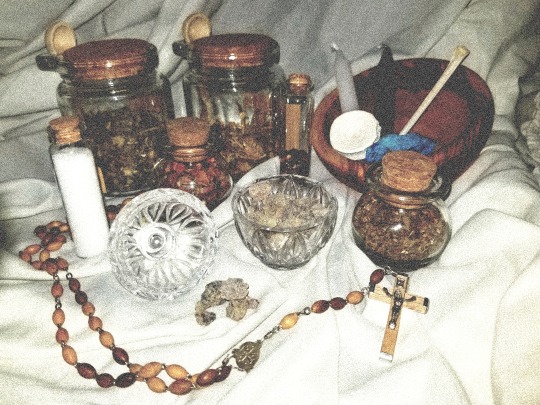
Some of my supplies
#my composition sucks#but oh well#my lame attempts at emulating an instragram post#bruja#brujeria#brujería#americanbrujeria#mexican american#catholic#spells#witchcraft#ingredients
18 notes
·
View notes
Text
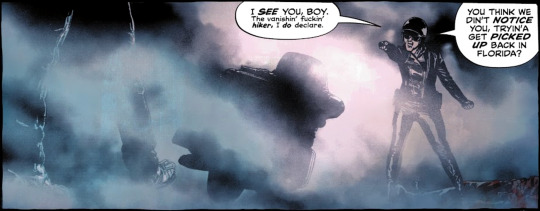
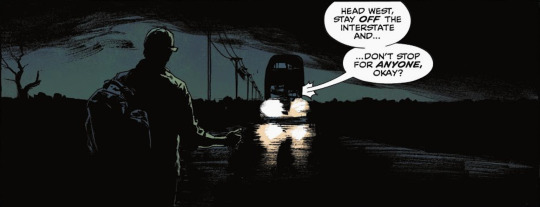

creepy magic murder cop: i see you, boy. the vanishin' fuckin' hiker, i do declare. you think we din't notice you, tryin'a get picked up back in florida?
( constantine, back in dead in america #1: head west, stay off the interstate, and ... don't stop for anyone, okay? )
creepy magic murder cop: he ain't here to save you, shitheel! he ain't here for nothin' but hisself! your time's over, shadow! you and alla your fuckin' parasites!
shivering and shaking like a wet purse chihuahua convincing myself that this is the ghost of frank north coming home to roost. riding out from cali to help his buddy once again.
#OOC.#shut up shut up i know i'm wrong but HEAR ME OUT OKAY#the last time we saw him was dealing with the brujeria!! with john and SWAMP THING!! swamp thing is back now!!!!#and i know he didn't DIE in america but he and benjamin were the only americans in the newcastle crew!!!!#why would they Not haunt their home turf!!!!#alternate theories are that it's Destruction from sandman or ACTUAL SHADOW from ACTUAL AMERICAN GODS#which would be fucking WILD. especially with the crows??? the motherfucking crows?????? mr wednesday ass omens#but idk i see motorcycle & i think frank. i love his stupid ass#bring him home!!!! if you're cold they're cold!!!!!#dead in america spoilers /#also listen while we're here? we are appreciating the ass. it's a nice ass#SCHED.
1 note
·
View note
Text
i need to know how to magic when you're broke and depressed, like i want to do things but i can't bring myself to do the simplest of task, least of all try to conect and cast a circle and all that
0 notes
Text
Things to put in your book of shadows
Of course, only put in your book of shadows/grimoire what you want. If you don't want to put certain subjects in your book then that's fine. It's your book, utilize it how you want. This is just a masterlist of ideas that I've put together. Feel free to add anything else to the list that I may have missed, because there's absolutely no way I included everything.
And for the love of all the gods, if you come across a closed entity or practice, don't try to work with the entity or practice if you're not already part of that group or tradition. You can research it but don't practice it.
+ A blessing and/or protection
+ A table of contents
+ About you:
Your current path
Your personal beliefs
Your spiritual journey
Favorite crystals/herbs/animals
Natal chart
Craft name
How you got into the craft
Astrology signs
Birthday correspondences (birth tarot card, birth stone, etc)
Goals (if you have any)
Anything other relating to your personal practice
+ Safety
Fire safety
What NOT to burn
Plants and oils that can be toxic to your pets
What crystals shouldn't be in water, sunlight, etc
Things that shouldn't be put out in nature (salt, glass, etc)
Potion safety
How to incorporate blood safely
+ Core concepts:
Intention and how it works
Directing energy
Protection
Banishing
Cleansing
Charging
Shielding
Grounding and centering
Visualization
Consencration/Blessing
Warding
Enchanting
Manifestation
+ Correspondence
Personal correspondence
Crystals and rocks
Herbs and spices
Food and drink
Colors
Metals
Number
Tarot card
Elemental (fire, water, air, earth)
Trees and woods
Flowers
Days
Months
Moon phases
Zodiac
Planets
Incense
Teas
Essential oils
Directions (north, south, east, west)
Animals
Local plants, animals, etc
Dream symbology
+ Different practices
Practices that are closed to you (some examples below)
Voodoo and Hoodoo **Closed**
Santeria and Brujeria **Closed**
Shamanism and native american practices **Closed**
Wicca and wiccan paths
Satanism, both theistic and non-theistic paths
+ Different types/practices of magick
Pop culture magick
Technology magick
Chaos magick
Green witchcraft
Lunar magick
Sea witchcraft
Kitchen magick
Ceremonial magick
Hedge witchcraft
Death witchcraft
Grey witchcraft
Eclectic witchcraft
Norse witchcraft
Hellenic witchcraft
Animism
+ Deities
The deity/deities you worship
Different pantheons (the main five are Celtic, Roman, Greek, Egyptian and Norse, all open)
Deities and pantheons that are closed to you
Common offerings
Their epithets
Their mythology
Their family
Deity worship vs deity work
Prayers and how to make your own
Deity communication guide
Devotional acts
Ways to get closer to them
+ Other spiritual entities
Angels
Ancestor work
Spirit guides
The fae
Demons
Familiars
House spirits, animal spirits and plant spirits
Other various folklore entities
Spirit etiquette
Cemetery etiquette
Setting boundaries with the spirits
Communication guide and etiquette
Grounding, banishing, protection and cleansing, aka: "Spirit work safety guide"
How they appear to you
Common offerings
Circle casting
+ Divination
Tarot cards
Oracle cards
Tarot and oracle spreads
Pendulum
Numerology
Scrying
Palmistry/palm reading
Tasseography (Tea leaf reading)
Rune stones
Shufflemancy (Shuffling of a playlist)
Dice divination
Bibliomancy (Randomly picking a phrase from a book)
Carromancy (Melted wax)
Pyromancy (Reading flames)
Psychic abilities
Astrology
Aura reading
Divination via playing cards
Lenormand
Sacred geometry
Angel numbers
+ Other types of magick
Candle magick
Crystal magick
Herbalism/herbal magick
Glamour magick
Hexing
Jinxing
Cursing
Weather magick
Astral work
Shadow work
Energy work
Sigils
Art magick
Knot magick
Crystal grids
Color grids
Music magick
Charms, talismans and amulets
+ Spellwork
What makes a spell work
Basic spell structure
What NOT to do
Disposing of spell ingredients
Revitalizing long term spells
How to cast spells
What to put in spells (See correspondence)
Spell mediums- Jar spells, spoken spells, candle spells, sigils, etc
Spell timing
Setting up a ritual
Taglocks: What they are and how to use them
+ Holidays and Esbats
Yule
Imbolc
Ostara
Beltane
Litha
Lughnasadh/Lammas
Mabon
Samhain
The 12 full moons (Esbats)
How to celebrate
Deity specific holidays
+ Altars and tools
What they are
The different types and their uses (travel altar, working altar, deity altar, ancestor altar, etc)
What you can put on your altar
What you use your altars for
Common tools in witchcraft
How to use the tools
Food and drink
Common herbs in recipes
Sabbat recipes
Moon water: What it is and how to use it
Potion bases
Tea magick
How to get your herbs
Foraging
+ Mental health and self care
Bath magick
Affirmations
Burnout prevention
Aromatherapy
Stress management
Mental health coping mechanisms
+ History of witchcraft
+ Dream records
+ How to differentiate between the magickal and the mundane
+ Calendar of celestial events (Esbats, retrogrades, etc)
+ How to dry herbs and flowers
+ What chakras actually are and how they work within Hinduism
+ History and traditional uses of reiki
+ The witches' alphabet
+ The runic alphabet
+ Common witchcraft terms
+ Common symbols in witchcraft
+ Your own witch tips
+ Good witchcraft books and authors to avoid
+ Any online resources you utilize often
#book of shadows#grimoire prompts#grimoire#book of shadows prompts#witchcraft#witchblr#witch community#witchcraft masterpost#long post#witchcraft 101#witches of tumblr#beginner witch#baby witch#witch#paganism#pagan#wicca#pagan witch#spirituality#witch tips#witch tag#closet witch#resources
6K notes
·
View notes
Text
Red Flags In Pagan Circles
I've seen a lot of younger, inexperienced members of the pagan (and witchy!) communities fall into some traps set up for them by people who wish to harm them. It saddens my heart to see this happen, as a lot of newer practitioners join these circles so they can learn! And because they're new, they often get taken advantage of.
So I'm creating this non-comprehensive list of some red flags in pagan and witch circles. Again, this isn't comprehensive. I will be updating this as time goes by, so I recommend checking in on this. For each red flag, I'll give a brief explanation as to why it's a red flag. As always, feel free to add your own in the replies and I'll add them to this post!
EDIT: 11/15/2022 - since there's been some people misunderstanding some of the things in this post, I've rewritten a lot of it so hopefully it makes more sense! Apologies to any confusion that's been caused. I also added some of the additions people have reblogged as well!
Usage of the terms "black" and "white" magic:
While this doesn't always mean someone is racist or xenophobic, within occult spaces there's this tendency to use this. The association of darkness/black things being evil isn't always a racist thing (we as humans are naturally afraid of the dark), but it did play a part in the Atlantic slave trade by associating dark skin with animalistic, evil ambitions and light skin as being pure and good. This isn't 100% a red flag, but it's good to keep an eye out when it is used! Another issue is that "black magic" was often used to refer to African traditional magic. It's why you'll often see hoodoo and voodoo portrayed as evil.
Argues that anyone can practice whatever they want, regardless of the status of it being closed or not:
Closed practices are closed for a reason, specifically because these practices have had their people murdered, their land stolen, and their practices made illegal for many years. The reason they are closed is so that outsiders cannot just come into their sacred spaces, take what they want, and bastardize it. The belief that you can join these closed practices without being initiated/born into them is rooted in colonialism and racism. This is one of the biggest red flags.
Some examples of closed practices are hoodoo, ATRs, Native American beliefs, brujeria, and santeria. Some plants are closed as well, so please do your due diligence.
The belief in folkism/volkism: that open pantheons should only be worshiped by those with their blood:
This is the complete opposite of the above. Open pantheons are open because they have not been passed down to us in a single line, and they are currently being revived. As such, these practices can't really be "closed". People who argue that open pantheons should only be worshiped by those with their blood are partaking in the same beliefs as Neo-Nazis. Please watch out for this especially in heathen/Nordic spaces! These people ARE NAZIS.
The specific dogwhistle here is "go back to your roots". (Thank you to @chrisasiaheartman)
Offers to teach advanced practices (baneful magic, deity work, etc.) to newcomers:
It's true that everyone is on different parts of their practice, and not everyone will progress the same way. However, there are certain practices that newcomers should not be doing until they have the basics down. This includes baneful magic and deity work, as you can open yourself up to disastrous consequences if you don't take the proper precautions. This isn't too much of a red flag as often the people doing this do mean well, but it's still something to look out for.
They use the terms "witchcraft" and "Wicca" interchangeably:
They are not interchangeable! Witchcraft is a practice, and Wicca is a religion. These types of people often believe you must be Wiccan to practice witchcraft, which you don't.
They refer to Wicca as an "ancient" religion:
This is false. Wicca was founded in the 1960s. If they do this, it could either be tongue-in-cheek, or it's just blatant misinformation. I would be careful.
They act as though baneful magic is evil.
It isn't. Baneful magic can be a form of protection and self-defense, it is not always a bad thing.
They act as though the "threefold law" is the end-all-be-all of practicing:
Not every witch believes in the threefold law, nor are you required to. This goes back into my point about them believing you must follow Wiccan teachings to practice witchcraft. You don't, period.
The use of racial or cultural slurs, even if they claim it's in a non-discriminatory way:
They are racist. If they're mentioning these slurs in an educational way, that's fine. But if a witchcraft space is just dropping these slurs casually in speech, it's a good sign of them being racist.
They push a specific diet:
You don't need to eat vegan or vegetarian to be a witch. No one has to. Some witches might think that's the best way to practice, and that's fine! Some witches might not subscribe to that idea, and that's fine too!
They push pseudoscience and/or anti-science ideologies (anti-vax, etc.):
This is extremely dangerous. Witchcraft and science can work together just fine. People have done this for so long, and pushing these ideologies can be extremely dangerous to peoples' personal health.
Enforcement of gender binaries:
This is things like the divine "masculine" and divine "feminine". Often times these people will also claim that the womb/uterus should be worshipped as well, and the people who do this are often TERFs/transphobic. Not everyone neatly fits into a gender binary. (Thank you to @hagstone-enthusiast for this!)
They promote the idea that only witches can be female, or that male witches are called warlocks:
Witches can be any gender, and the term warlock is actually derogatory as it means someone broke their oath.
Promotes the idea that mentally ill/neurodivergent witches that that way because they have a strong intuition:
This is very dangerous because being neurodivergent/mentally ill isn't a special thing, and it often is a detriment to many people. People who claim this often believe in indigo children/starseed children. In addition, look out for people to claim that neurodivergent people are that way because they "don't have a position attitude" (thanks to @urchinbeans5000).
2K notes
·
View notes
Text


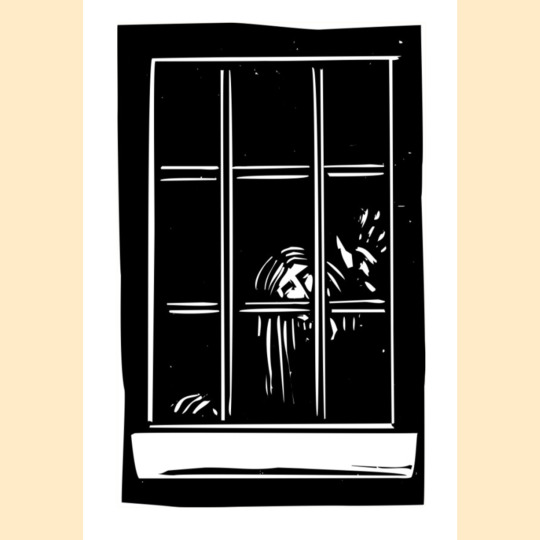

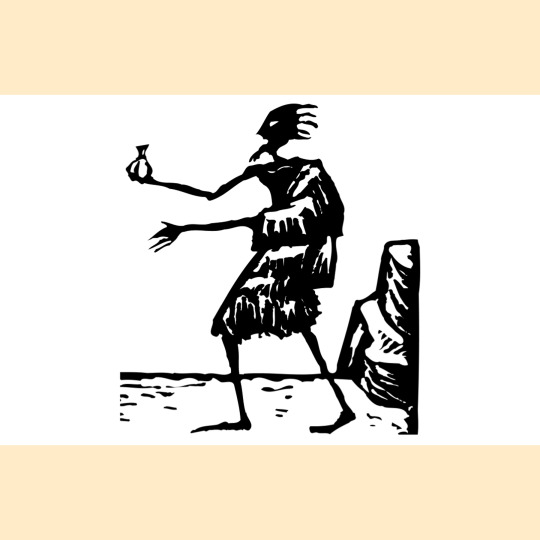

Other Magic (2020) is so good! The concept is straight forward: What if traditional folk magic, but translated into vaguely D&D terms for use in RPGs? Jesse Ephraim focuses primarily on American systems — pow-wows, rootwork, brujeria and Ozark magic — but also includes the very intense Russian tradition of Zagovory as a sort of contrast. This might seem odd, especially since all of these speak to a more recent historical era than most fantasy games. Early on, though, Ephraim points out that Manly Wade Wellman’s Silver John is a good example of a folk magician, and the Silver John stories are clear inspirations for D&D, despite being set in America in the 1960s, so this sort of thing can definitely work (see also Lowcountry Crawl).
Ephraim details charms, hexes, enchantments and all sorts of interesting details. At a glance, it might seem like folk magic is vastly underpowered in comparison to pulpy magic like the spells of D&D, but in reading through the zine you can see how naturally fantasy magic, particularly its defensive branches (detection, protection, etc), is rooted in folk traditions. Those aspects that lack a direct connection are clearly complimentary. They offer a kind of magical methodology that could be applied to RPGs for interesting effect — the idea of magic being a back and forth, or magic as the application of secret knowledge. The traditions here are lower key and less flashy than fireballs and lightning bolts, but they also imply new systems of play. One example: there’s a charm that can be used to force a shapeshifter into its natural form — there is no corollary for that in the standard suite of D&D spells, but you can easily image it in the game, and see how it might change a lycanthrope-centric scenario, for instance.
All the illustrations are fantastic woodcuts (I believe by Ephraim) that illustrated effects of spells and strange creatures they can summon, which leads us to tomorrow’s post…
#roleplaying game#tabletop rpg#ttrpg#dungeons & dragons#d&d#rpg#Folk Magic#Woodcut Games#Other Magic#Occult
208 notes
·
View notes
Text
Resources for Cuban and Caribbean Folk Magic 🇨🇺
Disclaimer: Cubans are not a monolith so when we say ‘Cuban Folk Magic’ its like saying ‘American Folk Magic’ in the sense that it is a BROAD term that includes multiple different cultural threads and traditions. Start by researching your ancestors and where they were from as a jumping off point.
Also, many of these resources are not Cuban themselves, but they either share the same practices or are academic or general sources. I have made it clear when a source isn’t Cuban. For this reason, I have expanded it to be the Cuban AND Caribbean Folk Magic List.
The List
General:
Irka Mateo - Taino - Insta 🇩🇴
Religion.Ancestral.Taino - Insta 🇵🇷
Sancista Brujo Luis - Espiritismo/Taino-Youtube | Blog 🇵🇷
OkaniLuna - Brujería/Taino - Youtube🇩🇴
Juliet Diaz - Brujería/Taino/Author - Instagram 🇨🇺
Sancista 7 Espadas - Espiritismo - Insta 🇵🇷
Odofemi - Regla de Ocha - Tumblr 🇺🇸
Eve the Medium - ATR/Espiritismo - Youtube 🇩🇴
Yeyeo Botanica - ATR/Espiritismo- youtube 🇺🇸
Botanica Candles & More - Great Podcast!! - youtube 🇨🇺 🇺🇸
Connecting w/ Guides and Goals by Adunola - youtube 🇺🇸
San Lazaro - Wikipedia - Novena - Yeyeo Botanica
Caridad del Cobre - Wikipedia
Orisha and Palo Herbs Directory- Website
Ewe (Herbs) Photo Guide - Website
Pueblo Originario Taino Section - Website
Books:
Taino Library* - Amazing resource for books of all kinds, many books about Taino, Cuban and Caribbean Spiritualities, Folklores and Songs! Multiple books on Cuban Myths and Folktales! Highly recommend - Website 🇵🇷
Espiritismo by Hector Silva🇩🇴
A Year in White by C Lynn Carr
The Modern Art of Brujería by Lou Florez(VERY BASIC just as a general introduction to what alot of modern Folk Practices look like)
American Brujeria by J. Allen Cross 🇲🇽🇺🇸
El Monte by Lydia Carbera 🇨🇺
Movies:
Cecilia (1982) - Youtube
Las Profecias de Amanda - Youtube
This list will grow as I find more resources that are reliable enough to share. If you have recommendations or would like to be added, please reach out.
Luz y Progreso 🕯️
(I also have included a Research Guide below the Cut!)
Guide to researching based on your ancestry:
If your family has African roots, you can seek Ocha/Lukumi, Palo, Arara, Cuban Vodou and other African Traditional Religions and Practices. Please approach elders within these respective practices to further your connection to them, rather than using books to create a practice for yourself. These are ancient, community based and are lifelong commitments, not just trendy powerful spells for you to get what you want.
If your family has indigenous roots, research Taino spirituality and modern practices , but also know that there were other tribes in the western and centeral parts of Cuba, with their own languages and traditions you can still learn about like the Guanahatabey. You may also consider joining a Yukayeke, but this isn’t required. Reconnecting and decolonizing is a separate and important topic that is not inherently witchcraft or folk magick-y… HOWEVER, researching and informing yourself with these practices can help you to see their influence within modern folk practices.
If your family has Asian roots, research the buddhist cults and folk practices throughout Cuba! Believe it or not, we also have people of Middle Eastern descent in Cuba who brought with them their own Hindu and Arabic Folk Traditions, which can be found throughout Cuba and the Caribbean as a whole.
If your family has Spanish roots, research some open practices like Espiritismo and Folk Catholicism! Look into the Patron Saints of Cuba, La Virgen de La Caridad del Cobre and San Lazaro. These also tie in to many of the other cultures who were forced to adopt certain elements to ensure survival of their traditions! You can also look into Brujería. Much like modern witchcraft, modern brujería has been commodified to hell and back, but there is still some great knowledge and power to be found there.
The fact of the matter is, that most of us can fit ourselves into two or more of these categories, and this crossover is where Folk Magic is often born. Its also important to note, in alot of these traditions you shouldn’t learn or share certain things at certain times, so some sources who share too much about Ocha and other ATRs should be avoided. Also, I can’t stress how important it is to talk to your family! Ask them about folklore or legends and stories! Also research history and folkore of the specific areas in Cuba your family is from. A-lot of folk magic is incorporated into stories.
Bendiciones, good luck on your Journey!🦎🐊

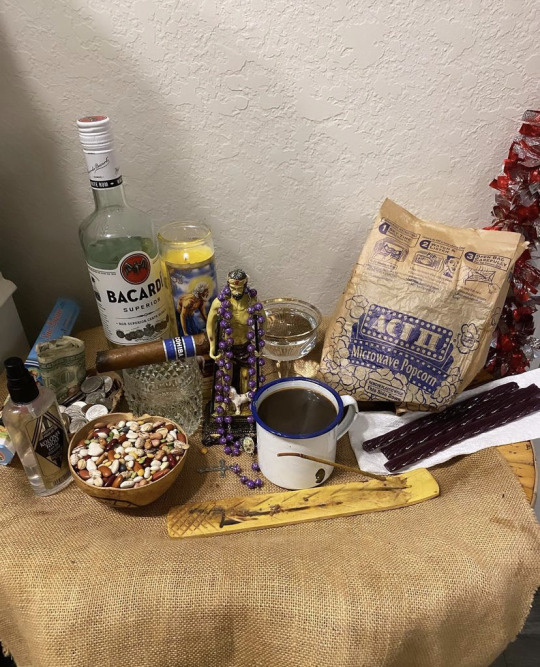
34 notes
·
View notes
Note
For your book, you planning on covering brujeria and other latin american magic, or are you focusing more on magic in europe and its root?
(i offer a handful of caldo)
Id like to do a section on African diasporic religions and their relationship to magic, it's an important element of American history, but I'm probably not gonna be able to go much in depth. It's a massive and diverse subject!
I'd like to do a short section with a robust reccomended reading list.
159 notes
·
View notes
Text
oh jiminy i got tagged by @wingsyouburn. i'm going to try and go for only reads i've done for fun because lit major
Last Read: Borne by Jeff VanderMeer. I mean what can I say, I really like his work, but since this WAS for a class I just wish I had more time to sit with all of it especially Strange Bird. But I really liked this one and I loved the ending.
Current Read: American Brujeria by J Allen Cross. Technically research for Jackrabbit Brujo, technically ouch ouchies oh owchies my heritage ow ;-; but i had to return it to the library bc someone had it on hold, so i'll resume reading later
Next Read: Probably something by Shirley Jackson!
tagging @lhinelle, @chaotic-history, @aconstantode, and @persante!
31 notes
·
View notes
Text
Hi, I’m New
I guess I’ll consider this an introduction post of sorts?
I’m a baby brujx who just recently re?discovered brujeria. My mom is white, but my dad’s family is mexican. My grandparents on that side are both dead, my grandmother passing away 23 years ago and my grandfather 3. We didn’t see him a lot, because even though he mellowed out in his old age, he was abusive to my dad when he was a kid.
They assimilated a lot from their native culture to an american one. They did not teach my dad and aunts a lot of spanish, and just didn’t keep some traditions alive.
All of this is to say, I grew up very white. I am white-passing, and when I am not tan, you can’t really tell that I’m half mexican. I have a decent spanish accent from my dad passing on the little bit he knows to me, but I am only able to carry a casual conversation in spanish. There are bits and pieces that survived, like my grandmother’s green chile and salsa recipes, listening to conción mexicana on the radio every sunday, and my dad scaring me with the story of the one time he heard La Llorona.
I grew up catholic (both sides of the family) but always felt a little off with it. I was intrigued by witchcraft, but never felt right delving into paganism and wicca. I looked white and sounded white and was identified as white, but my dad always told me that I was mexican.
I came across the term ‘bruja’ a couple months ago. I knew what a bruja was, a witch from central or south america, but I didn’t know what a bruja was. I looked deeper, and as I learned more, something clicked.
The catholic school I went to when I was young taught me about La Virgen de Guadalupe. The way my father does the sign of the cross with a kiss at the end. My aunts have what I call pseudo-ofrendas with spaces dedicated to deceased family, or the famous ‘Jesus Wall’ covered in crucifixes and saints and the Virgen Mary like alteras.
By learning about brujería, I feel like I am reconnecting with something that was taken from me that I am only now realizing was missing. My journey is just starting, and if you have read this far, you are welcome to join me and give me feedback.
¡Gracias todos!
7 notes
·
View notes